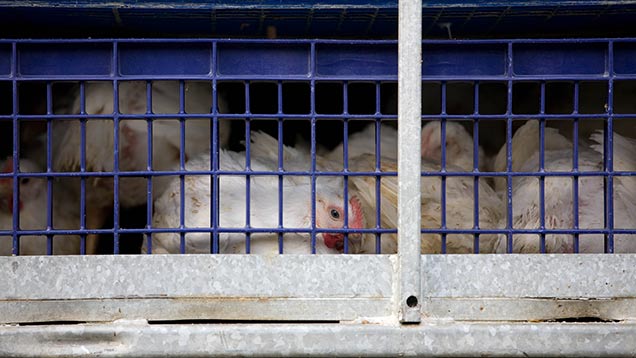Livestock and egg movements now allowed from bird flu zones
 ©Rex
©Rex Poultry producers located in the restriction zones around the Yorkshire duck farm infected with avian influenza should soon be able to start moving live birds, table eggs and hatching eggs off their farms.
Six days after the outbreak of H5N8 was first confirmed, and three days after the last of the 6,000 breeding ducks were culled, Defra is now inviting affected producers to apply for movement licences.
See also: Egg producers feel the strain in bird flu zone
Application forms have been placed on the Defra website (follow link, then scroll down to “movement licences” and click to open the EXD100 form).
The following licences may be applied for:
- Movement of live poultry from the restricted zones to slaughter
- Movement of table eggs from the restricted zones to a designated egg packing centre
- Movement of hatching eggs from a premises in the restricted zones to a designated hatchery
- Movement of mammals from premises with poultry on from the restricted zones to slaughter.
Completed forms should be emailed to LDCC-North-ActivityMng&Liaison-Licensing&Restocking@apha.gsi.gov.uk or faxed to 01905 768 649. The APHA licensing team can be contacted on 01905 768 732.
Conditions apply
Further conditions apply. For example, live birds going to slaughter will require examination by a government vet 24 hours or less before the movement takes place (though a private vet may be used in the wider surveillance zone only).
For hatchery eggs a private vet must inspect the poultry 24 hours or less before movement, but for table eggs, only the owner is responsible for checking birds for signs of disease.
For live birds and and hatching eggs, loading and sealing the lorry must be supervised by a vet as well.
If a licence is issued, it will allow a one-off movement only. “Further licences for other movements may be considered in due course,” says Defra.
Depending on how quickly these forms are now processed will provide some essential relief to many of the poultry businesses located in the protection and surveillance zones.
It is understood that there are some 129 holdings with some kind of livestock on them in the zones, of which about 60 are registered as keeping poultry.
As well as broilers needing to be thinned, and turkeys ready to go to slaughter, it is estimated that, as of Friday (21 November), there are approaching one million table eggs waiting to go to packers.
Big relief
The decision to allow movement will come as a big relief to egg packer Chippendale Foods, which has six units caught up in the restrictions. It told Farmers Weekly that it would run into problems meeting customer orders if those eggs were not available by the weekend – a problem made worse by the tight supply of free-range eggs on the wholesale market.
Faccenda Foods is also keen to see some movement, with one of its turkey breeding farms needing to shift eggs, and a turkey fattening unit needing to shift live birds.
But while those eggs and birds should be moving in the coming days, there has been less progress with getting licences for manure and fallen stock removal.
Egg producer Rick Dewhirst told Farmers Weekly earlier this week his manure belts under both his colony and free-range birds were filling up fast. As well as raising ammonia levels in the hen house, there was a risk the motors might not be able to move the belts if they got too full.
